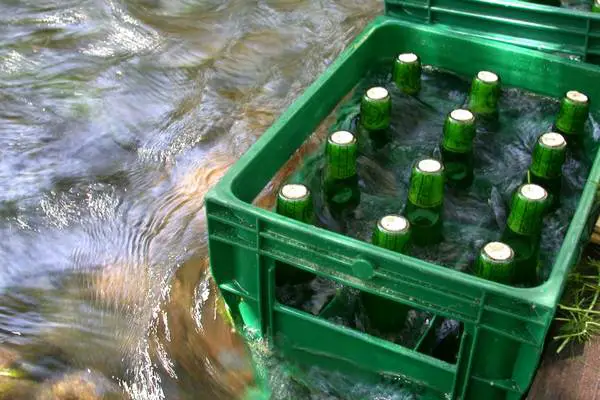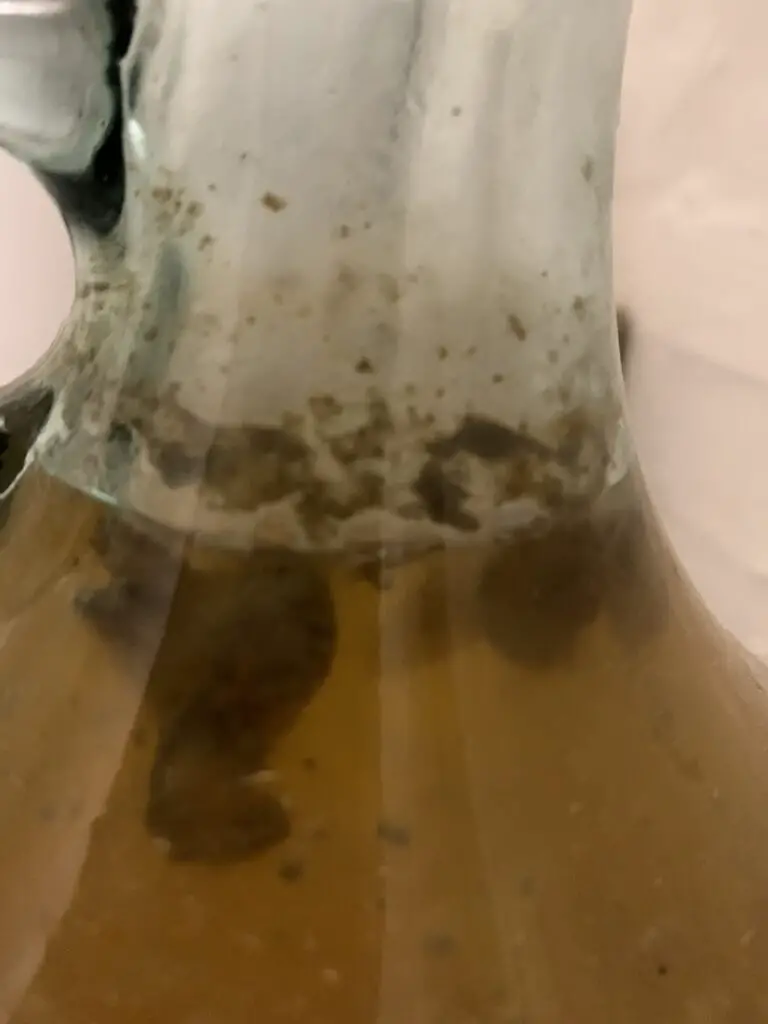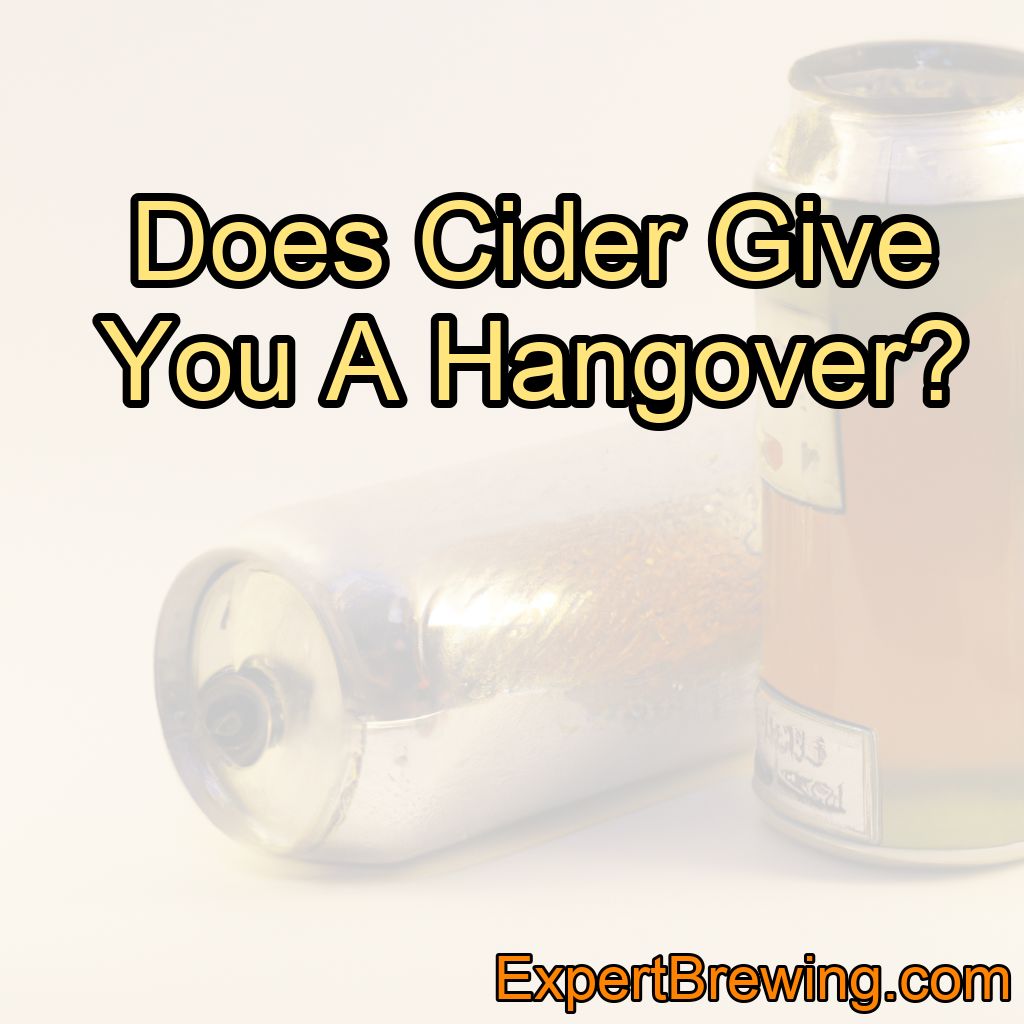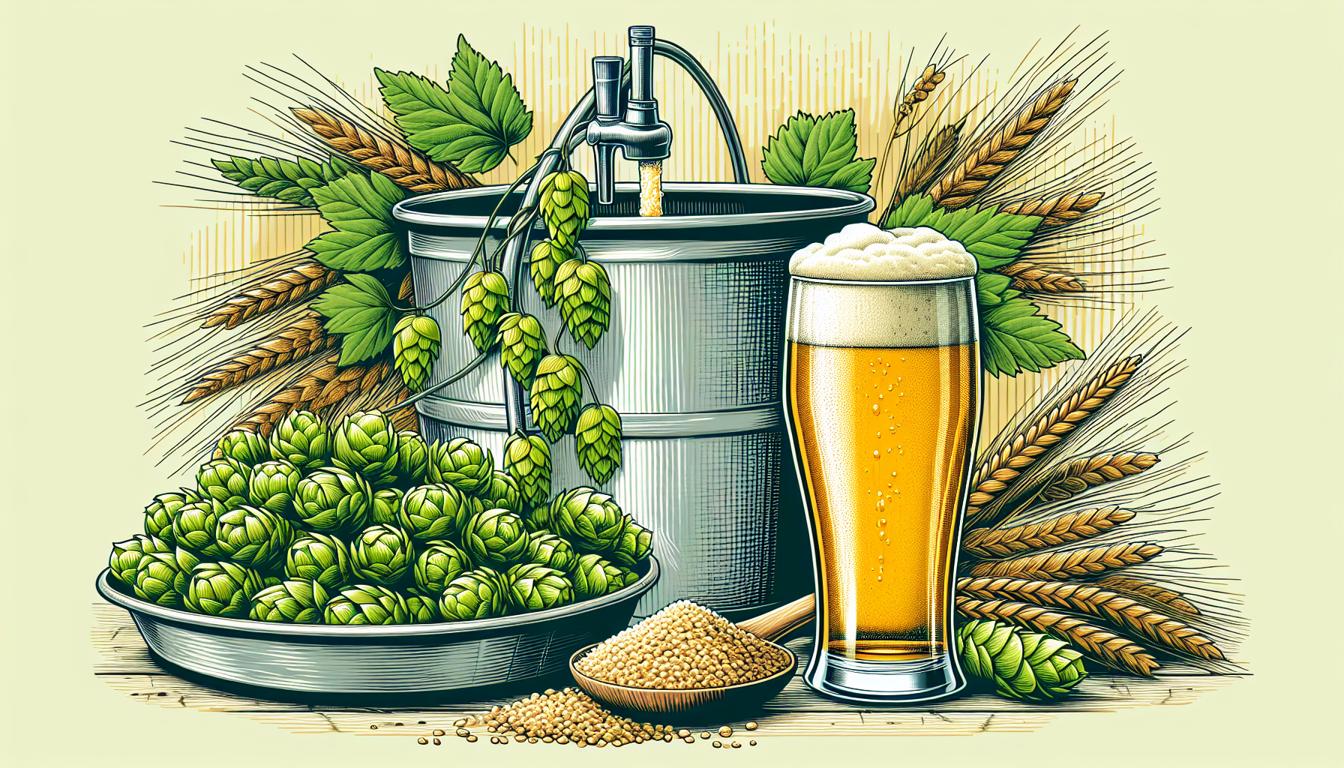As an expert brewer with years of experience, I’ve had the opportunity to taste and experiment with numerous types of alcoholic beverages, including hard cider.
This delicious, refreshing drink has seen a surge in popularity in recent years, and many people are discovering its unique flavor for the first time.
But as with any beverage, the question remains: does hard cider go bad unopened? In this blog post, we will explore this question in depth, looking at factors such as storage conditions, pasteurization, and the role of preservatives.
Yes, hard cider can go bad unopened, but it takes a considerable amount of time for that to happen. Proper storage conditions, pasteurization, and the presence of preservatives can all impact the shelf life of unopened hard cider.
Storage Conditions and Shelf Life
Like any other alcoholic beverage, the way you store your hard cider plays a crucial role in determining its shelf life.

Hard cider should be stored in a cool, dark place, away from direct sunlight and heat sources. Ideally, the storage temperature should ideally be between 40-60°F (4-16°C).
If stored properly, an unopened bottle of hard cider can last for up to 2 years.
Temperature Fluctuations
One of the factors that can negatively impact the shelf life of hard cider is temperature fluctuations. If the storage temperature is consistently changing, it can cause the cider to age more quickly, leading to a decrease in quality over time.
To avoid this problem, try to store your hard cider in a location where the temperature remains relatively stable.
Light Exposure
Another enemy of hard cider is light, particularly UV light. Prolonged exposure to light can cause the cider to become “lightstruck,” resulting in off-flavors and a decrease in overall quality. To protect your cider from light exposure, store it in a dark place or in a container that is designed to block UV light, such as a brown glass bottle.
Pasteurization and Preservatives
Pasteurization is a process that involves heating a liquid to a specific temperature for a certain amount of time to kill any harmful bacteria or microorganisms that may be present in it.
This process is used to extend the shelf life of hard ciders and other beverages. According to Michigan State University, high-pressure pasteurization (HPP) is one of the methods used to extend the shelf life of sweet ciderr², but it can also be used for hard ciders.
The effect of pasteurization on the shelf life of hard cider has been studied by researchers.
The study found that pasteurization at 63 or 71 °C effectively prolonged cider shelf life to 3 and 6 months, respectively³.
The study also found that the alcohol content of unpasteurized cider increased while TSS decreased during storage, as effects of continuing fermentation³.
In general, pasteurization can affect the taste of hard ciders.
According to PRO Engineering & Manufacturing, Inc., even micro pasteurization can affect the flavor profile of hard ciders by reducing the amount of yeast and bacteria present in the cider⁴.
However, it is important to note that different companies have their own expiration dates for hard ciders and that hard cider has a shelf life of around two to three years¹.
But what if you brew cider in the old fashioned manner, without pasteurization, will it spoil much faster?
No, in fact, after the fermentation into hard cider, the alcohol acts as a preservative that will make the cider last for at least a few years!
Pasteurization may extend this time and make the taste profile more stable, but most cider brewed in a historical sense has been unpasteurized.
The Role of Alcohol Content
It’s worth noting that the alcohol content of hard cider can also play a role in its shelf life. Generally speaking, the higher the alcohol content, the longer the cider will last.
This is because alcohol acts as a natural preservative, helping to inhibit the growth of bacteria and other microorganisms that can cause spoilage.
Other Preservatives
Many commercial hard ciders contain preservatives, such as potassium sorbate or sodium benzoate, which help to extend their shelf life.

These preservatives work by inhibiting the growth of bacteria, yeasts, and molds, making it more difficult for the cider to spoil.
If your cider contains preservatives, its shelf life may be longer than that of a cider without preservatives.
Signs of Spoilage
If you’re unsure whether your unopened hard cider has gone bad, there are a few telltale signs to look for. These can include:
Bulging or Leaking
If the bottle or can is bulging or leaking, this is a clear indication that the cider has spoiled. This is likely due to the build-up of gas from fermentation or bacterial activity.
Off-odors
If you notice any off-odors when you open the cider, such as a sour or musty smell, this is a sign that the cider has gone bad.
Mold
In some cases, mold can develop on the surface of the cider or around the rim of the bottle. This is a sure sign that the cider is no longer safe to drink.
Mold is a strictly aerobic (oxygen dependent) organism and therefore appears only when the cider has been exposed to oxygen!
Keeping your cider in airtight storage containers is crucial to keeping it free of mold and other spoilage organisms.
Homemade Hard Cider
If you’re a homebrewer, you may be wondering how the shelf life of homemade hard cider compares to that of commercial varieties.
The answer largely depends on your brewing and bottling practices. If you follow proper sanitation procedures and use quality ingredients, your homemade cider should have a shelf life similar to that of commercially produced cider.
However, if you choose not to pasteurize your cider or use preservatives, you should expect a shorter shelf life. In these cases, it’s best to consume your homemade hard cider within a 6-18 months after bottling.
It all depends on what type of cider you make and how you make it, though.
Here are some tips to ensure that your homemade hard cider lasts as long as possible once bottled:
- Ensure that all equipment used in the process is clean and sanitized to prevent contamination.
- A finished hard cider is seen as microbially safe at pH 3.0 or lower while a pH of 3.0-3.8 may require sulfites (SO2) to stabilize and protect the cider.
- Carbonation can help preserve the cider by reducing oxygen exposure and lowering pH. You can use priming sugar or force carbonation to achieve this.
- Store the cider in proper airtight containers. You can use bottles, cans or manucube (bag in a box) similar to a 5L wine dispenser box.
- Exclude air at all times after primary fermentation to prevent spoilage.
- Store the cider in a cool, dark place.
- Once opened, store the cider in the refrigerator at 40 degrees Fahrenheit or lower and drink within 5 days. Unopened hard cider can last many years if it is stored properly at temperatures between 35-40 degrees F and it should be kept away from direct sunlight.
Its not an exact science but…
Throughout my years as a brewer, I’ve had the chance to taste a variety of hard ciders, both good and bad. I can attest to the fact that when hard cider goes bad, the change in flavor is quite noticeable.
A once crisp and refreshing beverage becomes sour and unpalatable.

I’ve also seen firsthand how proper storage can extend the shelf life of hard cider.
I once discovered a case of unopened cider that I had forgotten about in a cool, dark corner of my basement.
To my surprise, the cider was still delicious and enjoyable even after nearly five years!
However, I have tried to sum up every relevant factor that contributes to the shelf life of hard cider and how important it is.
| Factor | Description | Worst Conditions | Best Conditions | Impact |
|---|---|---|---|---|
| Apple Quality | The quality of the apples used in making the cider can affect its shelf life. Fresh, high-quality apples are ideal. | Overripe or damaged apples | Fresh, healthy apples | + 1 to 3 months |
| Juice Extraction Process | Proper extraction techniques minimize contact with oxygen, reducing the chances of spoilage and extending shelf life. | Contamination and oxygen exposure | Gentle, oxygen-reducing extraction methods | + 1 to 2 weeks |
| Fermentation Process | Control of fermentation conditions and the use of appropriate yeast strains can enhance the cider’s stability. | Uncontrolled temperatures or improper yeast selection | Controlled temperatures and suitable yeast strains | + 1 to 2 months |
| Filtration and Clarification | Effective filtration and clarification methods remove impurities, reducing the risk of microbial growth. | Insufficient filtration or clarification | Thorough filtration and clarification methods | + 6 to 12 months |
| Pasteurization | Heat treatment through pasteurization can kill harmful microorganisms, extending the shelf life of the cider. | Under-pasteurization or improper heat application | Proper pasteurization techniques and adequate heat levels | + 12 to 24 months |
| Containers | Proper containers, such as using good glass bottles with tight corks or cans, provides a protective barrier against oxygen and contaminants. | Poorly sealed cans or bottles. | Airtight, quality corked bottles. | + 4 to 12 months |
| Storage Conditions | Ciders should be stored in cool, dark places with stable temperatures to prevent flavor degradation and spoilage. | Exposure to heat, light, and temperature fluctuations | Constant cool temperature and protection from light | + 2 to 12 months |
| Carbonation | Carbonation levels can impact shelf life. Proper carbonation methods and control of dissolved oxygen are essential. | Inconsistent carbonation or high dissolved oxygen levels | Consistent carbonation levels and low dissolved oxygen | + 1 to 2 months |
| Preservatives | The use of natural or added preservatives like sulfites can inhibit microbial growth and extend the cider’s shelf life. | Absence of preservatives or ineffective preservation methods | Proper use of preservatives and appropriate dosages | + 5 to 24 months |
| pH Level | Maintaining a low pH (acidic environment) inhibits microbial growth and can help prolong the cider’s shelf life. | Elevated pH levels or alkaline conditions | Low pH levels, acidic environment | + 4 to 12 months |
| Handling and Transportation | Proper handling and transportation practices prevent physical damage and maintain the cider’s quality and freshness. | Rough handling, excessive agitation, or temperature abuse | Gentle handling, controlled temperature, and minimal agitation | + 1 to 2 months |
The expected range of time added to the shelf life is an estimation based on my personal intuition as an experienced brewer.
Conclusion
In conclusion, hard cider can indeed go bad unopened, but it takes a considerable amount of time for that to happen.
Proper storage conditions, pasteurization, and the presence of preservatives can all impact the shelf life of unopened hard cider.
To ensure you always enjoy a crisp, refreshing glass of cider, be mindful of storage conditions and consume your cider within its recommended shelf life.
Here are 10 facts about hard cider and its shelf life:
1. Proper storage conditions are crucial to extending the shelf life of hard cider.
2. Temperature fluctuations can negatively impact the quality of hard cider.
3. Light exposure can also cause hard cider to spoil more quickly.
4. Pasteurization helps to extend the shelf life of hard cider by killing harmful bacteria.
5. Unpasteurized hard cider has a shorter shelf life and should be consumed within a few months.
6. Preservatives can also help to extend the shelf life of hard cider.
7. Bulging, leaking, off-odors, and mold are all signs that hard cider has gone bad.
8. Alcohol content does play a role in the shelf life of hard cider, with higher alcohol content generally leading to a longer shelf life.
9. Homemade hard cider can have a similar shelf life to commercial varieties, depending on brewing and bottling practices.
10. It’s best to consume hard cider within its recommended shelf life to enjoy its crisp, refreshing flavor.
FAQs
How long does it take for cider to go bad?
Cider can go bad within a few days to a few weeks, depending on the storage conditions. If kept refrigerated and sealed, it can last up to a month or more. However, if left at room temperature or exposed to air, it can spoil within a few days and develop a sour taste and unpleasant smell.
How long does cider last unrefrigerated?
Cider can last unrefrigerated for a few days to a week, depending on the specific type and how it was made. However, it is recommended to store cider in the refrigerator to extend its shelf life and maintain its quality.
Does alcoholic cider go bad?
Yes, alcoholic cider can go bad if it is not stored properly or if it is past its expiration date. The taste, texture, and aroma of the cider can change, and it can become unsafe to consume. It is important to check the expiration date and store the cider in a cool, dark place to prevent spoilage.
Does unopened hard cider go bad?
Unopened hard cider can last for several months to a year or more if stored properly in a cool, dark place. However, it may lose some of its flavor and quality over time. It is always best to check the expiration date on the bottle or can and consume it before that date for the best taste and quality.
How can you tell if cider is bad?
You can tell if cider is bad by checking for signs of spoilage such as a foul smell, mold growth, or a sour taste. Additionally, if the cider appears cloudy or has a fizzy texture, it may have gone bad and should not be consumed.
How long does unopened hard cider last?
Unopened hard cider can last up to 6-12 months if stored properly in a cool and dark place such as a cellar or refrigerator.
References:
(1) Shelf Life of Sweet Cider – Michigan State University. https://www.egr.msu.edu/bae/sites/default/files/content/SS2021/10_SS21_487_Blakeskravaritlairdbr1pabinkelsimonk10ilce%20-%20%20BE487_SS21_Team10_Assign4_Poster_V2.pdf.
(2) The Effect of Pasteurization and Shelf Life on the Physicochemical …. https://www.mdpi.com/2306-5710/6/3/43/htm.
(3) Batch & Tunnel Pasteurization | Cider | Hard Cider | PRO Engineering …. https://prowm.com/pasteurization/hard-seltzer-cider/.
(4) How Long Does Hard Cider Last? Does Hard Cider Go Bad?. https://eatdelights.com/hard-cider-shelf-life/.




